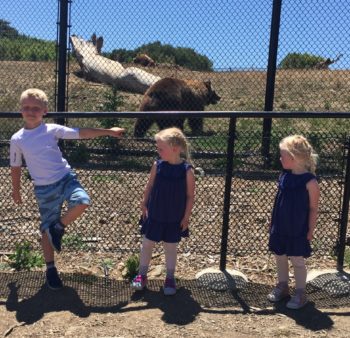 How Parents Help Each Child Succeed in School
How Parents Help Each Child Succeed in School
As a special education teacher, one of the most important lessons I’ve learned is that no two children learn the same way. Every student brings their unique strengths, needs, and learning styles into the classroom, so a one-size-fits-all approach to teaching just doesn’t work. This is where differentiated instruction comes in. Differentiated instruction allows teachers to meet students where they are, provide the support they need, and help them progress at a pace and in a way that works best for them.
Understanding the role of differentiated instruction in your child’s education can be incredibly helpful. Not only does it help you understand how your child’s teacher tailors instruction to meet their needs, but it also offers insight into how you can support your child’s learning at home.
What is Differentiated Instruction?
Differentiated instruction is a teaching method that adapts the content, process, and products of learning to meet the varying needs of students. It is grounded in the understanding that students come to the classroom with different backgrounds, learning styles, interests, and readiness levels. Rather than teaching every student in the same way, I adjust my lessons to ensure that all students can access the material and demonstrate their understanding in a way that suits them.
Educational researcher Carol Ann Tomlinson, a leader in differentiated instruction, emphasizes the importance of considering students’ differences in readiness, interests, and learning profiles when planning instruction. The goal is to ensure that all students are challenged appropriately without feeling overwhelmed or under-stimulated.
Why Differentiated Instruction Matters
1. Every Child is Unique
In my classroom, I see students at different points in their learning journey. Some may grasp new concepts quickly, while others need additional support or more time to master a skill. For example, during a reading lesson, I might have a student who is just learning to read sitting next to a child who is ready for chapter books. If I were to give both students the same assignment, one might feel frustrated and give up, while the other would be bored. Differentiated instruction allows me to tailor the learning experience so that each child is challenged at their level without feeling overwhelmed.
2. Engagement is Key to Learning
Another reason why differentiated instruction is so important is that it keeps students engaged in their learning. When students are given tasks that match their interests and abilities, they are more likely to stay motivated and invested in their education. Engagement is especially critical for students who may struggle with certain subjects, as it helps prevent them from becoming disengaged or frustrated.
In my classroom, I often give students choices in how they demonstrate their understanding. For example in math, if we are learning about areas and perimeters, some students might design a zoo or bedroom, while others might prefer solving math equations.
By offering options, I ensure that students can approach the material in a way that excites them and plays to their strengths. Self-determination theory, developed by psychologists Edward Deci and Richard Ryan, supports this approach, stating that students are more engaged when they feel a sense of autonomy in their learning.
3. Differentiation Promotes Equity
Equity in education means ensuring that every student has the opportunity to succeed. Differentiated instruction is key to achieving this. It’s not about giving every child the same resources or assignments but about meeting their individual needs and providing the right level of support. In math, for example, some students might benefit from manipulatives to visualize problems, while others are ready for more abstract reasoning. This flexibility ensures that all students can access the curriculum and make progress.
In secondary classrooms, this principle is just as important. As students prepare for life beyond school, differentiated instruction helps ensure that every student is challenged appropriately and has the skills they need to succeed in their life and career goals.
How Differentiated Instruction Looks in My Classroom
Differentiated instruction can take many forms depending on the subject matter and students’ needs. Here’s a look at how I apply it in different areas of my classroom:
- Differentiating Content: I adjust what students learn based on their current understanding. In reading, for instance, some students may read leveled books, while others tackle more complex texts. The goal is for each student to be challenged but not overwhelmed.
- Differentiating Process: This involves varying the ways students engage with the material. For example, during a math lesson, one group might work on hands-on activities, another might use digital tools, and some might receive direct instruction from me. These different approaches ensure that all students are making sense of the content in a way that works best for them.
- Differentiating Product: Students demonstrate their learning in different ways. After a unit on historical events, one student might create a timeline, another might write an essay, and a third might develop a creative project like a video. By offering choices, I ensure that students can showcase their strengths and interests.
- Differentiating the Learning Environment: The classroom setup also plays a role. I offer flexible seating options, including desks, standing tables, and floor spaces, so students can work in an environment that suits their learning style. Some students may need quiet spaces to focus, while others thrive in collaborative group settings.
How Parents Can Support Differentiation at Home
Parents play a crucial role in supporting differentiated instruction outside of the classroom. Here are a few ways you can help:
1. Embrace Your Child’s Learning Style
Every child learns differently. Some kids are hands-on learners, while others are more visual or auditory. Pay attention to how your child best absorbs information, and provide opportunities for them to learn in ways that resonate with them. For instance, if your child is a kinesthetic learner, you might use household items for hands-on math activities, like using coins to practice addition and subtraction.
2. Encourage Choice and Autonomy
Just as differentiated instruction in the classroom gives students choices, you can support this at home by giving your child options in how they complete their homework or explore a new topic. Offering them autonomy helps build their sense of responsibility and keeps them engaged in their learning.
3. Provide Additional Support or Challenge
If your child is struggling with a particular subject, work with their teacher to identify ways to support them at home. This might include additional practice with specific skills, using educational games or apps, or even working with a tutor. On the flip side, if your child is excelling, encourage them to delve deeper into subjects they are passionate about through extra reading, projects, or activities that go beyond what is covered in school.
4. Communicate with the Teacher
Differentiated instruction is most effective when there is open communication between home and school. If you have concerns about your child’s progress or if you notice they need more support or challenge, don’t hesitate to reach out to their teacher. Working together ensures that your child is getting the most out of their learning experience.
Differentiated instruction is at the heart of effective teaching. It allows teachers to meet students where they are, keep them engaged, and promote equity in the classroom. As parents, your involvement in supporting differentiation at home can make a significant difference in your child’s academic success. By embracing your child’s learning style, encouraging choice, providing support or challenge when needed, and maintaining open communication with their teacher, you help create a learning environment where your child can thrive both at school and at home.
 Beyond Backpacks: Setting Up for School Success (Part 1)
Beyond Backpacks: Setting Up for School Success (Part 1) Summer Boundaries for Kids!
Summer Boundaries for Kids! What Should Parents Know About AI?
What Should Parents Know About AI?
 How Parents Help Each Child Succeed in School
How Parents Help Each Child Succeed in School